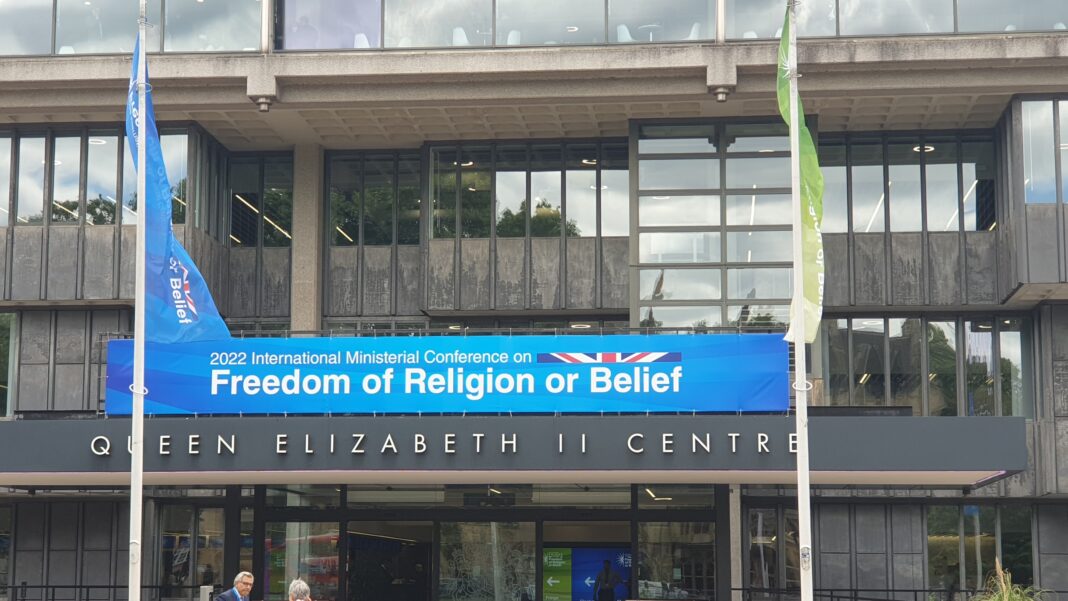The fourth annual Ministerial conference on Freedom of Religion or Belief (FoRB) was held in London following a strong impetus to bring awareness of, and action to, the many transgressions against FoRB around the world.
This initiative was first held in Washington DC and the instigation of the US government in 2018, and then again in Washington DC in 2019. Lockdowns cancelled the 2020 conference whilst the 2021 conference, hosted by Poland, was virtual.
One of the most notable aspects of this initiative is that it seeks to go against the current of political interests driven primarily by economic factors – which certainly puts these deliberations on a higher ethical ground.
That the UK administration has embraced this initiative and held such a major conference – taking over the entire QE II Conference Centre in London for two days – is clearly a commitment to FoRB. Today, the state of religious freedom in many parts of the world is in a pretty poor state.
From China to Russia, from Nigeria to India and Pakistan, we find human rights abuses founded in religious discrimination ranging from rape and murder to organ harvesting and banning of innocent religious groups.
The two days of the conference along with many other additional ‘side events’ in Parliament, government buildings, and others around London and the UK were held with the intention to bring focus on the often egregious violations and suppression of this essential human right.
Will this bring about improved conditions for those believers – be it religious or non-religious – remains to be seen? But the signs are promising. A multi-country juggernaut is being built to highlight these issues rather than turn a blind eye.
A number of conference declarations were signed by governments – certainly not enough as we can see, the key declaration was signed by only 30 countries. Led by the United States and the United Kingdom, the remainder were mostly European – though notable omissions were France, Germany and Spain. Whilst outside of Europe, Australia, Canada, Brazil, Columbia, Israel and Japan were also signatories.
Overall statments
The Broad Conference Statement of Freedom of Religion or Belief can be found on the government site (here). It commits governments:
- to protect “freedom of thought, conscience, religion, or belief and ensure individuals can freely change their beliefs, or not believe, without penalty or fear of violence”;
- to “raise awareness of the current challenges to FoRB across the world, the relevance of FoRB to other human rights, and best practice in preventing violations and abuses and protecting and promoting FoRB for all”;
- to “speak out bilaterally, as well as through multilateral institutions, against violations and abuses of the right to freedom of religion or belief” whilst working “more closely together with international partners, civil society actors, human rights experts, academia and faith and belief actors to implement practical solutions to address FoRB challenges, exchange best practice, and build shared commitments” whilst
- strengthening “the voices and build the capacity of defenders of FoRB, including religious or belief actors, inspiring future leaders and young people, and building and reinforcing global coalitions for collective action”.
Words versus actions
We know that words are cheap whilst action and commitment can be expensive – but the simple fact that these governments have made such a move in the face of growing intolerance in some parts of the world is a positive sign.
Some actions taken, in particular by the US administration have shown their teeth by declaring the actions taken in Myanmar against Rohingya Moslems as genocide – something the UK government should emulate.
It goes without saying that civil society played a significant role in encouraging and moving this whole process along.
The creation of FoRB Round Tables or Forums are entirely civil society innovations open to any individual or belief group where issues of religious discrimination can be aired and actions taken to urge government or other sectors of civil society to take a stand on different issues.
These processes play an important role in keeping governments both informed and on their toes with regard to abuses occurring in the world. Most notable ones are in the US, UK and in Brussels (convening groups from around Europe) whilst one about to start in Mexico was announced during the conference.
Constructive Criticism
The conference organisation was not without criticism, however.
Many NGOs and even governments complained about the extremely late notification of seat availability and corresponding access passes for attendees which generated a lot of difficulties for attendees.
Quite a number of NGOs complained about the ‘discrimination’ between civil society and official government delegates as civil society did not have access to any of the main proceedings.
A floor had been assigned to civil society with 12 booths and this was relatively empty most of the time.
Those with limited civil society passes were consigned to stay in isolation whilst the main conference went on without them, with room for many more attendees.
This differentiation was seemingly at odds with the spirit of the whole conference and was not a credit to the organisers. Unfortunately, the successful model used by the Organisation for Security and Cooperation in Europe’s Human Dimension Meetings, where all attendees are able to meet each other and attend all meetings was not adopted –creating discontent amongst civil society groups.
Conclusion
Still, whatever the thinking behind excluding sections of civil society, these things are mainly organisational issues which can be easily corrected for future conferences.
Overall, the initiative driven by the UK and US governments to ensure that the vital human right of freedom of religion or belief is raised, exposed, protected and nurtured was an extremely important step in moving the political momentum in the right direction.









